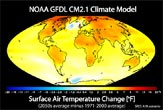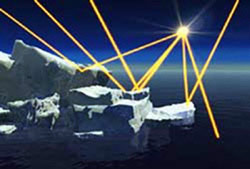113 Nations Agree: Climate Change 'Very Likely' Caused by Humans

Get the world’s most fascinating discoveries delivered straight to your inbox.
You are now subscribed
Your newsletter sign-up was successful
Want to add more newsletters?

Delivered Daily
Daily Newsletter
Sign up for the latest discoveries, groundbreaking research and fascinating breakthroughs that impact you and the wider world direct to your inbox.

Once a week
Life's Little Mysteries
Feed your curiosity with an exclusive mystery every week, solved with science and delivered direct to your inbox before it's seen anywhere else.

Once a week
How It Works
Sign up to our free science & technology newsletter for your weekly fix of fascinating articles, quick quizzes, amazing images, and more

Delivered daily
Space.com Newsletter
Breaking space news, the latest updates on rocket launches, skywatching events and more!

Once a month
Watch This Space
Sign up to our monthly entertainment newsletter to keep up with all our coverage of the latest sci-fi and space movies, tv shows, games and books.

Once a week
Night Sky This Week
Discover this week's must-see night sky events, moon phases, and stunning astrophotos. Sign up for our skywatching newsletter and explore the universe with us!
Join the club
Get full access to premium articles, exclusive features and a growing list of member rewards.
This story was updated at 12:19 p.m. EST.
PARIS (AP) _ A panel of international scientists predicted Friday that global warming will continue for centuries no matter how much people control pollution, in a bleak report that blamed humans for killer heat waves, devastating droughts and stronger storms.
The report said people were ''very likely'' the cause of global warming _ the strongest conclusion to date _ and placed the burden on governments to take action.
''It's later than we think,'' said Susan Solomon, co-chair of Intergovernmental Panel on Climate Change.
Man-made emissions of greenhouse gases are to blame for fewer cold days, hotter nights, heat waves, floods and heavy rains, droughts and stronger storms, particularly in the Atlantic Ocean, the 21-page report said.
It highlighted ''increases in global average air and ocean temperatures, widespread melting of snow and ice, and rising global mean sea level.''
Get the world’s most fascinating discoveries delivered straight to your inbox.
Authors of the report called it conservative: It used only peer-reviewed published science and was edited by representatives of 113 governments who had to agree to every word. It was a snapshot of where the world is with global warming and where it is heading, but does not tell governments what to do.
Click here to read the report (pdf).
Yet if nothing is done, the world is looking at billions of dollars in costs adapting to a warmer world over the next century, co-author Kevin Trenberth said in an interview. He also warned of at least 1 million deaths in droughts, floods and hurricanes.
The study said no matter how much civilization slows or reduces its greenhouse gas emissions, global warming and sea-level rise will continue for centuries.
''This is just not something you can stop. We're just going to have to live with it,'' said Trenberth, the director of climate analysis at the U.S National Center for Atmospheric Research. ''We're creating a different planet. If you were to come back in 100 years' time, we'll have a different climate.''
Scientists fear world leaders will take that message in the wrong way and throw up their hands, Trenberth said. Instead, the scientists urged leaders to reduce emissions and adapt to a warmer world with wilder weather.
''The point here is to highlight what will happen if we don't do something and what will happen if we do something,'' said another author, Jonathan Overpeck of the University of Arizona. ''I can tell you if you decide not to do something the impacts will be much larger than if we do something.''
The next step is up to public officials, scientists said.
''It is critical that we look at this report ... as a moment where the focus of attention will shift from whether climate change is linked to human activity, whether the science is sufficient, to what on earth are we going to do about it,'' U.N. Environment Program Executive Director Achim Steiner said.
The strongly worded report put pressure on the Bush administration to reduce the United States' growing share of gases that trap heat in the atmosphere.
The White House issued a statement less than four hours after the report's release defending President Bush's six-year record on climate change.
It said Bush and his budget proposals have devoted $29 billion to climate-related science, technology, international assistance and incentive programs _ ''more money than any other country.''
Bush has called for slowing the growth rate of U.S. greenhouse gas emissions, which averages 1 percent a year, but has rejected government-ordered reductions.
Since 1990, U.S. greenhouse gas emissions have gone up 16 percent. The Bush administration has rejected the Kyoto Protocol, which calls for cuts in emissions of greenhouse gases.
Sharon Hays, White House associate science adviser, called the study ''a significant report. It will be valuable to policy makers.''
Another report by the panel later this year will address the most effective measures for slowing global warming.
If it looks bad now, the harmful effects during the 21st century ''would very likely be larger than those observed during the 20th century,'' the report said.
The panel predicted temperature rises of 2-11.5 degrees Fahrenheit by the year 2100. It said its best estimate was for temperature rises of 3.2-7.1 degrees.
On sea levels, the report projects rises of 7-23 inches by the end of the century. An additional 3.9-7.8 inches are possible if recent, surprising melting of polar ice sheets continues.
The panel, created by the United Nations in 1988, releases its assessments every five or six years, though scientists have been observing aspects of climate change since as far back as the 1960s. The reports are released in phases _ this is the first of four this year.
The projected effects of global warming would vary in different parts of the globe. The closer to the poles, the higher the temperature spikes, the study said.
Dramatic temperature spikes are likely to be seen within 22 years in most of the Northern Hemisphere, the report showed. Northern Africa and other places will see dramatically less rainfall.
The United States could see a 10-degree temperature rise by the end of the century and a more arid south and west, Overpeck said.
And that's just average temperature increases and rainfall amounts, something that doesn't affect people much. The harshest consequences of global warming are the heat waves, droughts, floods, and hurricanes, said study co-author Philip Jones of Britain's University of East Anglia. And those have increased dramatically in the past decade and will get worse in the future, he said.
Global warming could eventually lead to an ''ice-free Arctic,'' warned Gerry Meehl, an official with the U.S National Center for Atmospheric Research.
And when that happened 125,000 years ago, seas rose between 13 and 20 feet. That is looking like a real possibility for the 22nd Century, the report said, though some scientists fear much of it could happen before the end of the century.
Trenberth said the world is paying more attention to scientists now than to previous warnings in 1990, 1995 and 2001. ''The tension is more now,'' he said.
As the IPCC report was being released, environmental activists rappelled off a Paris bridge and draped a banner over a statue used often as a popular gauge of whether the Seine River is running high.
''Alarm bells are ringing. The world must wake up to the threat,'' said Catherine Pearce of Friends of the Earth.
Associated Press writer Angela Charlton contributed to this report.
More to Explore
- Surprising Results of Global Warming
- Emerging Environmental Technologies
- The History of Climate Change Science
- Video: Goldilocks and the Greenhouse
- How You Can Fight Global Warming
Global Warming Features
- Earth Will Survive Global Warming, But Will We?
- Strange Weather's Loose Link to Global Warming
- Global Warming or Just Hot Air? A Dozen Different Views
- Serious Climate Change: Winds Blew in Reverse During Last Ice Age
The Effects
Top 10 Surprising Results of Global Warming
Related Stories
- Seas Rise
- More Wildfires
- Deserts to Grow
- Mountains Grow
- Ground Collapses
- Glaciers Disappear
- Allergies Get Worse
- Summer Gets Longer
- Animal DNA Changing
- Animals Change Behavior
- Rivers Melt Sooner in Spring
- Increased Plant Production
- Hurricanes Get Stronger
- Some Trees Benefit
- Lakes Disappear
Other Possibilities
 Live Science Plus
Live Science Plus











